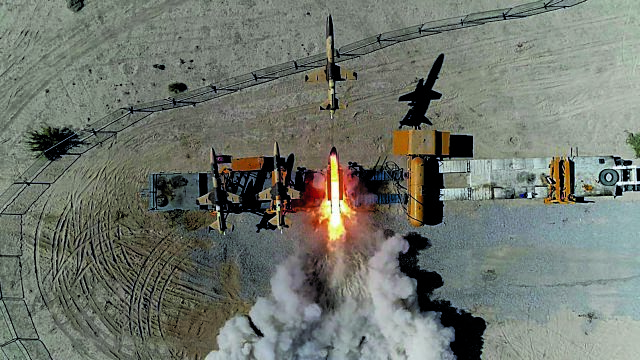
“We have escaped the danger of the vicious circle of attacks and counterattacks” by Iran and Israel, after the “expected” attack – the “strong warning” issued by the Israelis in Isfahan last Friday, predicts international scholar Alexandros Despotopoulos, a researcher at the Institute of Political Studies in Iran. . Department of Modern Turkish and Asian Studies at EKPA.
Vima explains that the direct confrontation between the two eternal enemies, after the Israeli “surgical” counterattack, will end, because “the United States and other major international stakeholders, such as China and Russia, do not want to develop the regional area.” A crisis in a global conflict.
Why did Israel finally respond to the strike, while the United States prevented it? Why was Isfahan targeted? Did the fact that the city is home to nuclear facilities play a role?
“There is no doubt that the United States and other major international stakeholders, such as China and Russia, do not want the regional crisis to develop into a global conflict. What is striking, of course, is that American influence appears to be strengthening in Iran more than in Israel, which reflects the significant decline in influence in Israel compared to previous eras. Regarding the Israeli reaction, in this case it was expected, with attacks carried out on military targets inside Iranian territory, coinciding with the previous strike on Tehran, and the attack on Isfahan represents a strong warning from Israel to Iran that “there is a possibility That we can successfully attack your nuclear facilities at any time.”
Will Israel not follow up on the matter, or is it “preparing” for stronger strikes? Are the nuclear facilities near Isfahan safe?
He added: “From Friday’s attack, it is easy to conclude that the facilities in Isfahan could be destroyed by Israel if it wanted to. The prevailing view that Iran does not have the ability to successfully deal with large-scale, powerful ballistic attacks has been confirmed. Regarding the Israeli strike, we can say “Match” would describe it.”
I mean?
He added, “The Israelis responded to the Iranian attack (April 13) in exactly the same way. The choice of Isfahan, of course, carries a high symbolism and a strong threat. Perhaps this is the reason why no one wants to take responsibility or reveal it.”
Both the Iranians and the Israelis do not want to engage in an endless cycle of counterattacks, or further escalate tensions.
Iranian officials told the New York Times that the attack “was carried out by small drones, possibly launched from inside Iran,” and that “radar systems did not detect any unidentified aircraft entering Iranian airspace.” What does this really mean?
He added, “These messages broadcast by Iran aim to convince its satellites, as well as public opinion inside the country, that it has not been attacked by Israel.” This narrative serves Tehran's claim that it has sufficient defenses to prevent Israel from striking military installations, and justifies it not to respond to this attack, because it is not attributed to Israel. The truth is that Tehran was concerned that Israel's former enemies were mobilizing to support it in repelling the Iranian attack.
Do you mean Jordan?
“Yes. Who would have imagined a few years ago that Jordan, for example, would intercept Iranian drones to prevent them from striking Israel? After the Abraham Accords (which marked the bilateral relations between Israel, the United Arab Emirates, Bahrain, and Morocco), it became clear that the vast majority of Middle Eastern countries are not ready. To participate in a large military operation against Tel Aviv.
A senior Iranian official told Reuters there were no plans for immediate retaliation. What will Tehran seek next?
He added, “I believe that we have now escaped the danger of the vicious circle of attacks and counterattacks between the two countries. Iran will focus on supporting its 'satellites' such as Hamas and Hezbollah so that it can continue the 'dirty' work against the greater enemy.”
Have we avoided the Iranian-Israeli war, and are we not at its beginning?
“Exactly. Right now, war between Israel and Iran does not seem likely. The United States already has an open front in Europe with Russia over Ukraine, and the last thing it wants is a war breaking out in the Middle East. China has been hurt by trade disruption due to the crisis, and does not want The Russians have opened another front with the West. Israel is already occupied in the Gaza Strip, and Iran realizes that it does not find allies willing to follow it in a possible break with Tel Aviv.
Meanwhile, an Israeli missile strike targeted air defense sites belonging to a pro-Iranian militia in southern Syria on the same night as the strike against Iran. Does this specifically indicate that the war between Iran and Israel will continue from now on by proxy through Syria, Lebanon and Iraq?
He added, “The parallel conflicts between Israel and Iran's 'satellites' have continued and will continue as long as the issues of the Middle East are not settled, especially the Palestinian issue.” Accordingly, other conflicts plaguing the region continue, such as those in Iraq, Syria, and even Yemen.
How could the Israeli-Iranian conflict affect Gaza?
“The reluctance of other countries to support Iran and the West’s defensive support gives Israeli Prime Minister Benjamin Netanyahu the opportunity to complete the military operation in the Gaza Strip and advance to the last piece of land.”

“Hipster-friendly coffee fanatic. Subtly charming bacon advocate. Friend of animals everywhere.”





More Stories
F-16 crashes in Ukraine – pilot dies due to his own error
Namibia plans to kill more than 700 wild animals to feed starving population
Endurance test for EU-Turkey relations and Ankara with Greece and Cyprus